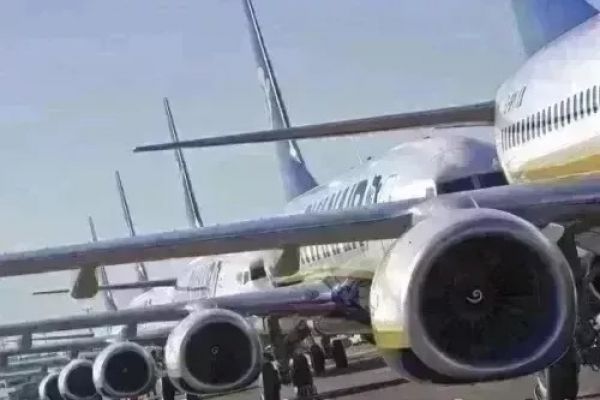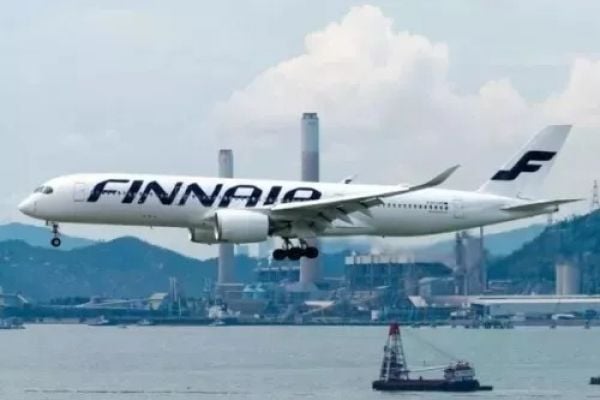Ryanair on Monday 7 November posted its largest ever profit for its key summer season and said it expected very strong passenger and fare growth for years to come as customers switch from higher-cost rivals.
Details
But it also warned Europe's recovery remained susceptible to shocks from COVID-19 and Russia's invasion of Ukraine, and said aircraft delivery delays from Boeing could hit its capacity next summer.
Ryanair shares were up by 5.5% at 1205 GMT on Monday 7 November.
The Irish airline, Europe's largest by passenger numbers, earned €1.371 billion in the six months to the end of September, the first half of its financial year.
While that was just short of a forecast of 1.385 billion in a company poll of analysts, it was well ahead of its previous first-half record of €1.29 billion in 2017.
"Concerns about the impact of recession and rising consumer price inflation on Ryanair’s business model have been greatly exaggerated," chief executive Michael O'Leary said.
"We expect these strong fundamentals will continue to underpin robust traffic and average fare growth for the next 18-months at least," he said, pointing to a possible influx of US and Asian passengers to Europe next summer.
Profit and traffic are poised for "very strong growth" until 2025 assuming oil prices remain relatively stable, O'Leary added in a video presentation.
A loss-making winter, during which Ryanair hopes to boost traffic 10% above pre-COVID levels, is likely to leave the airline with an after-tax profit of between €1 billion and €1.2 billion for the year to 31 March, he said.
O'Leary said the July-September quarter had delivered growth on a scale he had never seen, with 15% traffic growth combined with a fare rise of 14% thanks to the combination of pent-up demand and the post-COVID retrenchment of rivals.
While bookings in November and December remain strong, O'Leary said it was reasonable to expect single-digit percentage growth in average fares for the full-year to the end of March and a similar result next summer.
Several rivals have provided upbeat guidance in recent weeks with Wizz Air, Aer Lingus-owner IAG and Lufthansa all saying they were seeing continued strength in ticket sales despite inflation fears.
O'Leary said a wave of consolidation in the coming years was likely to leave Ryanair as the only major low-cost carrier in Europe as no one could compete with its average cost per passenger, which is under €30 now and is only likely to grow 10% in the coming three or four years.
Low-cost rivals easyJet and Wizz have repeatedly rejected suggestions by O'Leary that they will struggle to compete.
Ryanair plans to grow from a record 168 million passengers this financial year to 185 million next.
However, while the airline is planning for the delivery of 51 737 MAX aircraft by next summer, O'Leary said he was concerned Boeing might fall 5-10 aircraft short, knocking 1 or 2 million from that target.
Fuel Hedging Position
O'Leary said he favoured maintaining a fuel hedging position of around 50% next year as anything higher might leave the airline exposed if prices fall.
UPDATE 4-Ryanair Hails 'Very Strong' Recovery With Record Summer Profit
The above news was followed by the following update:
Ryanair on Monday 7 November posted its largest ever profit for its key summer season and said it expected very strong passenger and fare growth for years to come as customers switch from higher-cost rivals.
But it also warned Europe's recovery remained susceptible to shocks from COVID-19 and Russia's invasion of Ukraine, and said aircraft delivery delays from Boeing could hit its capacity next summer.
Ryanair shares were up by 5.5% at 1205 GMT on Monday 7 November.
The Irish airline, Europe's largest by passenger numbers, earned €1.371 billion in the six months to the end of September, the first half of its financial year.
While that was just short of a forecast of 1.385 billion in a company poll of analysts, it was well ahead of its previous first-half record of €1.29 billion in 2017.
"Concerns about the impact of recession and rising consumer price inflation on Ryanair’s business model have been greatly exaggerated," chief executive Michael O'Leary said.
"We expect these strong fundamentals will continue to underpin robust traffic and average fare growth for the next 18-months at least," he said, pointing to a possible influx of US and Asian passengers to Europe next summer.
Profit and traffic are poised for "very strong growth" until 2025 assuming oil prices remain relatively stable, O'Leary added in a video presentation.
A loss-making winter, during which Ryanair hopes to boost traffic 10% above pre-COVID levels, is likely to leave the airline with an after-tax profit of between €1 billion and €1.2 billion for the year to 31 March, he said.
O'Leary said the July-September quarter had delivered growth on a scale he had never seen, with 15% traffic growth combined with a fare rise of 14% thanks to the combination of pent-up demand and the post-COVID retrenchment of rivals.
While bookings in November and December remain strong, O'Leary said it was reasonable to expect single-digit percentage growth in average fares for the full-year to the end of March and a similar result next summer.
Several rivals have provided upbeat guidance in recent weeks with Wizz Air, Aer Lingus-owner IAG and Lufthansa all saying they were seeing continued strength in ticket sales despite inflation fears.
O'Leary said a wave of consolidation in the coming years was likely to leave Ryanair as the only major low-cost carrier in Europe as no one could compete with its average cost per passenger, which is under €30 now, excluding fuel, and is only likely to grow 10% in the coming three or four years.
Low-cost rivals easyJet and Wizz have repeatedly rejected suggestions by O'Leary that they will struggle to compete.
"Europe is inexorably moving towards a similar out-turn as North America where you will have three very large, somewhat higher cost high-fare connecting carriers, and one very large low cost carrier" in Ryanair, O'Leary said.
Ryanair plans to grow from a record 168 million passengers this financial year to 185 million next.
However, while the airline is planning for the delivery of 51 737 MAX aircraft by next summer, O'Leary said he was concerned Boeing might fall 5-10 aircraft short, knocking 1 or 2 million from that target.
O'Leary said he favoured maintaining a fuel hedging position of around 50% next year as anything higher might leave the airline exposed if prices fall.
News by Reuters, edited by Hospitality Ireland. Click subscribe to sign up for the Hospitality Ireland print edition.









